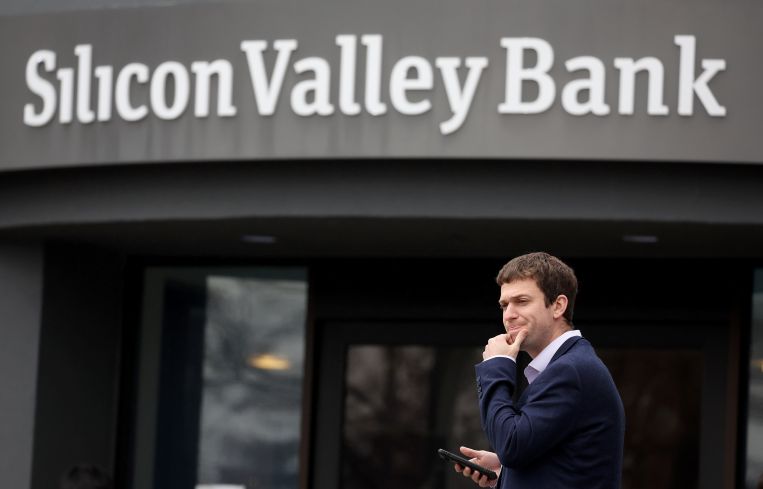Silicon Valley Bank Collapses, Assets and Deposits in Hands of FDIC
The proptech and CRE lender’s failure marks the largest banking institution collapse since WaMu's in 2008.
By Cathy Cunningham March 10, 2023 2:31 pm
reprints
Silicon Valley Bank (SVB) — a major funder of tech and crypto startups, as well as some commercial real estate properties — collapsed on Friday and is in the hands of the Federal Deposit Insurance Company (FDIC) as receiver, according to multiple reports and an announcement from the FDIC.
The failure is the biggest U.S. bank collapse since the Global Financial Crisis (GFC) — the last comparable failure was that of Washington Mutual in 2008 — and the first FDIC-insured bank to fail in 2023.
Regulators stepped in when the bank, known for its expansive tech startup customer base, faced a run on its deposits amid concerns around its solvency after failing to raise $2 billion in capital to cover losses. The collapse was swift, with talks of continued capital raising efforts hitting headlines as late as Thursday night, followed by a cease of trading in the bank’s shares before the opening bell rang on Friday morning and the bank’s collapse being announced by noon.
According to the FDIC’s announcement Friday, the Santa Clara, Calif.-based lender had roughly $209 billion in assets and $175.4 billion in deposits as of December 2022. The FDIC, now tasked with liquidating the bank’s assets, announced that it had created a new bank, Deposit Insurance National Bank of Santa Clara, to house SVB’s holdings in the meantime.
The New York Times reported that the bank was in talks with a potential buyer Friday morning, and that there’s now wider concern among investors regarding further bank failures, as stock prices dipped by 20 percent Friday morning for some institutions including First Republic and Signature Bank.
SVB customers with deposits exceeding $250,000 seem to have the short end of the stick, as that amount exceeds FDIC insurance thresholds. Those customers, likely several tech startups, are now at the mercy of the FDIC selling off assets to repay them.
Prior to the collapse, billionaire hedge funder Bill Ackman, CEO and founder of Pershing Square, weighed in on Twitter Thursday, tweeting: “The failure of @SVB Financial could destroy an important long-term driver of the economy as [venture capital-] backed companies rely on SVB for loans and holding their operating cash. If private capital can’t provide a solution, a highly dilutive [government] preferred bailout should be considered.”
Ackman added that a bailout “should be designed to protect [SVB’s] depositors, not equity holders or management. We should not reward poor risk management or protect shareholders from risks they knowingly assumed.”
He continued with the ominous note that “the risk of failure and deposit losses here is that the next, least well-capitalized bank faces a run and fails and the dominoes continue to fall,” referencing the bank failure contagion that permeated the GFC.
Barclays’ Lea Overby and Anuj Jain noted in a CMBS research report Friday that SVB recently completed a sale of its roughly $21 billion available-for-sale securities to reposition its balance sheet following interest rate headwinds, and wrote that while those issues pose similar risks to other banks, SVB’s situation seems to be “unique.”
In the meantime, there’s some market chatter that the SVB collapse could impact the Fed’s rate hike train.
“While we do not think there is a risk of broader contagion from this episode or similar situation at other banks, the market seems to think this might limit the Fed’s ability to continue hiking rates despite sticky inflation,” Overby and Jain wrote.
According to SVB’s Q4 filing, cited in the Barclays report, the bank had roughly $1.6 billion of agency CMBS. It also has roughly $14.5 billion in its agency, held-to-maturity CMBS. “While we do not think there is a significant risk of those being reclassified and sold, it does remain a risk,” according to the report.
The bank employs around 8,500 people.
Only last August, SVB put down roots in Miami with a new office, signing a long-term lease for 8,600 square feet at the Four Seasons Hotel and Tower in Brickell. It was one of the key backers in proptech firms including Reonomy’s early funding and recently provided $5 million to title data tech-focused company Flueid.
While best known for its tech customer base, the bank also provided commercial real estate loans, specializing in the construction and repositioning of multifamily, office, industrial and retail properties.
Cathy Cunningham can be reached at ccunningham@commercialobserver.com



